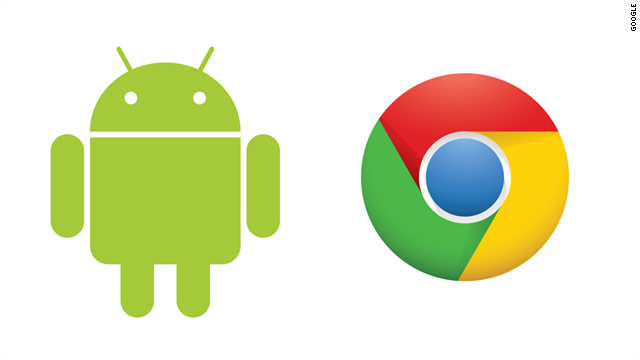Are Google's Android and Chrome on a collision course?

- Google's Android and Chrome OS teams envision their software running everywhere
- The two systems could eventually compete on tablets or computers
- Google execs say it's part of a drive to offer "choice" and reflect "different visions"
San Francisco (CNN) -- Mike Cleron, a Google software engineer for the Android operating system, made an ambitious pronouncement onstage at the company's annual conference last week.
"We want one OS that runs everywhere," Cleron said, referring to the popular system for smartphones and tablets.
The next day at the conference, Sundar Pichai took the very same stage to stake a very similar claim. Except Pichai was referring to a completely different Google operating system.
"Chrome OS can be applied to a variety of form factors," said Pichai, who is a senior vice-president for the division that makes Google's brand-new operating system, which will be deployed in a line of laptop computers (sometimes referred to as notebooks). "We have chosen initially to focus on notebooks because that's where most of the Web usage is today."
Can Google support both operating systems?
"Chrome OS is a thought experiment rather than a viable product on any form factor," said Sarah Rotman Epps, a consumer-electronics analyst for Forrester Research, in an e-mail to CNN. "Google should invest its resources to improve an imperfect Android before supporting a second fledgling OS."
The first laptops running the Chrome software, called Chromebooks, are scheduled to hit stores June 15. An Android laptop already exists. Motorola Mobility's Atrix 4G smartphone can transform into a laptop using a peripheral and built-in software. There are also tablet-laptop hybrids that rely on Android.
On Android, the Web browser is just one application. Chrome OS is, put simply, a browser.
These are two competing methodologies for Google, a company that made 96% of its revenues from advertising last year. Only a sliver of that comes from ads shown on phones (or to let Google tell it: "Mobile advertising is still in relative infancy"). Google doesn't derive any income directly from Android.
As Google often says, the company benefits from people using the Internet more. And that's what Chrome OS facilitates.
"We wanted to rethink the entire (computing) experience and distill it down to nothing but the Web, and that's what Chrome OS is," Pichai said. "The software experience is very unique," unlike Windows computers, which he said are "really, really complicated."
Since throwing a coming out party for Chrome OS at Google I/O last year, the company has sent out thousands of prototype laptops to testers around the world. So far, the effort hasn't been a resounding success.
But Pichai said his team has fixed various bugs with the hardware and software, and so Google will test next month whether a Chromebook is something people will be willing to pay for. If it strikes a chord, Pichai is apparently poised to wedge Chrome into "a variety of form factors," he said.
Meanwhile, the Android team is boasting about the flexibility of its operating system. Cleron said: "We have phones in every size and shape, phones with keyboards that slide, phones with keyboards that flip, phones with built-in game controllers, tablets in every size from 7 inches to 10 inches, even tablets that transform into laptops, and who knows what else is coming."
Google is welcoming one more electronics category to the greater Android family this summer. The Google TV software will be based on the same version of Android that's used on tablets and will include the Market for downloading apps.
"If I had to pick one word to explain Android's phenomenal growth over the past year, that word would be 'choice,'" Cleron said. "Consumers really like choices."
Pichai said the two Google divisions don't currently compete but instead appeal to different audiences. Separately, they've found success. The Chrome browser has 160 million active users, and Android has activated 100 million devices.
"We share common code, common infrastructure, but the final expressions are two different visions. And we provide choices to users," Pichai said. "The potential of competition or collision that you're talking about in the future -- we don't think about it that way internally at all."
Microsoft makes a distinction between Windows 7 and Windows Phone 7. So, too, does Apple between Mac and iOS.
For Google, the line between Chrome OS and Android may be only temporary.
Google says it is in the early stages of building a version of Chrome OS for tablets but has no formal product to announce. In an interview with reporters on Wednesday, Pichai downplayed that project, saying, "Chrome OS on a tablet, that's not what we're working on."
"All of these systems are designed to scale and run across a set of devices over time," Pichai said. "You want to design a computing experience, an operating computing experience, to run everywhere."
For the launch of Chrome OS, Google has signed on two manufacturers: Acer and Samsung Electronics. Three dozen electronics makers already use Android.
But asking these partners to support an unproven system with their development and financial resources will be a tough sell, said Rotman Epps, the Forrester analyst.
